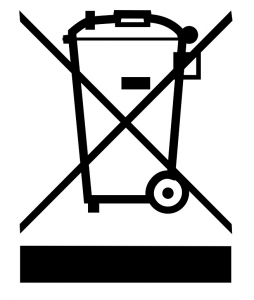Environment & Sustainability
At a time when progressing climate change is already showing devastating effects worldwide, it is our commitment to do something about it.
At PF Schweißtechnologie GmbH, we work together with our partners, customers and suppliers to optimise our products and processes for their impact on the environment and climate change.
Environmentally sound disposal
If one of our products, its components or accessories is disposed of, it must be done in an environmentally friendly way, sorted by materials.
For products with hydraulic drive or other lubricants and operating materials: Ensure that hydraulic oil and other lubricants are disposed of professionally.
Waste of Electrical and Electronic Equipment
The EU Directive 2012/19/EU is also called the WEEE Directive. The WEEE Directive (WEEE = “Waste of Electrical and Electronic Equipment”) deals with the handling of waste electrical and electronic equipment. The aim of this directive is to avoid unnecessary electronic waste and to achieve a high recycling rate and recyclability.
PF Schweißtechnologie GmbH is registered with the German registration office EAR under the WEEE registration number 27521436. You are welcome to return your old device to us and we will take care of the disposal. Alternatively, we will be happy to provide you with the name of the nearest sales partner who can dispose of your old device for you on request. Products covered by this directive are marked with the symbol of the crossed-out dustbin.
Batteries and accumulators
The Battery Directive 2006/66/EC regulates the cross-border trade in batteries and accumulators in the European Union.
As the implementation of this directive in the national laws is the responsibility of the individual countries, there are sometimes considerable differences.
In Germany, the Battery Act (BattG) is the national implementation of the Battery Directive.
According to this law, PF Schweißtechnologie GmbH is in the role of a dealer, since properly registered batteries or accumulators are already used in our products.
According to the Battery Act (BattG), end consumers in Germany are legally obliged to return all used rechargeable batteries and batteries.
They may only be returned via collection points that are affiliated to the collection systems in accordance with § 7 Paragraph 1 Sentence 1.
Disposal via household waste is prohibited!

The adjacent symbol indicates accumulators and batteries whose disposal in the household waste is prohibited.
The following designations stand for the decisive heavy metal. These are affixed to the batteries and accumulators in question.
Pb = lead, Cd = cadmium, Hg = mercury, Li = lithium.
Always return your used rechargeable batteries and batteries to an authorised collection point.
By doing so, you fulfil the legal obligations and protect the environment.
Batteries and rechargeable batteries with lithium
To dispose of batteries and rechargeable batteries containing lithium, always contact a local specialist company. If disposed of or handled incorrectly, these batteries and accumulators can cause serious injury and fire. Never ship batteries and rechargeable batteries with lithium content without first consulting the carrier as well as the recipient.
If you have any questions or problems with the return of batteries and rechargeable batteries from products of PF Schweißtechnologie GmbH, you can contact us or your local service partner at any time.
REACh
Regulation (EC) No 1907/2006 (REACh Regulation) is a set of EU rules on the authorisation and restriction of chemicals.
This regulation applies to companies in all industrial sectors that are economically active in the EU.
Over the years, this regulation has been continuously amended and supplemented. The European Chemicals Agency (ECHA) provides a list of SVHC (Substances of Very High Concern), which is constantly being updated and expanded.
The REACh Regulation is intended to encourage or, under certain circumstances, oblige manufacturers and companies to replace highly hazardous chemicals with less hazardous ones or to eliminate them altogether.
According to the REACh regulation article 33, PF Schweißtechnologie GmbH is obliged to pass on information about its own products containing substances on the SVHC list to more than 0.1% by mass within the supply chain. As soon as PF Schweißtechnologie GmbH is informed about SVHC in a product or component, we will inform our customers.
You will receive a corresponding REACh declaration from us on request.
RoHS
The RoHS II Directive (Restriction of Hazardous Substances) is the EU Directive 2011/65/EU. It serves to restrict the use of hazardous substances in electrical equipment. Since 2013, it has replaced the previous RoHS Directive 2002/95/EC. In Directive 2015/863/EU, four additional substances were added to RoHS Annex II. Directive 2017/2102 further described and specified the scope of RoHS II. It is the duty of the EU member states to implement the requirements of the RoHS Directive in their national legislation. The most important change brought about by RoHS II was the strengthening of the RoHS directive into a CE directive. This meant that from now on there was no longer a need for separate RoHS labelling. Conformity with RoHS is declared by affixing the CE marking. All other RoHS-related seals and markings have lost their validity since RoHS II.